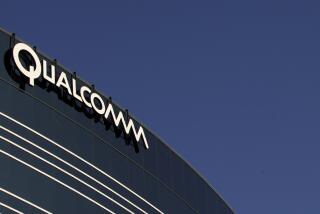U.S. letter outlines concerns about 5G leadership if Qualcomm is acquired by Broadcom
U.S. officials worry that if Broadcom succeeds in its hostile takeover of Qualcomm, that might weaken the San Diego chipmaker and open the door for China to become the leader in next-generation wireless technologies, among other national security concerns.
The Treasury Department laid out its concerns in a letter to both chipmakers explaining its Sunday order to delay Qualcomm’s annual shareholder meeting.
At the meeting — previously scheduled for Tuesday — the San Diego company’s shareholders are to vote on whether to hand control to Broadcom by putting Broadcom-backed candidates on Qualcomm’s board of directors.
The secretive Committee for Foreign Investment in the U.S. (CFIUS) issued the order so it could further investigate the national security implications of a possible takeover. The multi-agency body is headed by the Treasury.
Qualcomm included the letter in a filing Monday with the U.S. Securities and Exchange Commission. The company has delayed its annual meeting to April 5.
The deal would be the largest in semiconductor industry history. So far, Qualcomm’s board has rejected Broadcom’s $79 per share bid for being too low and for failing to provide enough protection should regulators block the takeover.
In the letter, Treasury officials said many of its national security concerns surrounding the potential takeover are classified. Some relate to Broadcom’s relationships with third party foreign entities.
The letter raised red flags about a Broadcom takeover possibly weakening Qualcomm’s long-term competitiveness in telecommunications technologies and standard setting – opening the door for Chinese companies such as Huawei to become dominant players in upcoming 5G networks.
5G is expected to begin rolling out in 2019, bringing ultra-fast and reliable connectivity to everything from cars to health care devices to infrastructure. According to the letter, Huawei has been increasing its research and development work in 5G and owns about 10 percent of essential patents for 5G technology.
“While the United States remains dominant in the standards-setting space currently, China would likely compete robustly to fill any void left by Qualcomm as a result of this hostile takeover,” the letter said.
Broadcom has pledged to move its headquarters from Singapore to the U.S., possibly as soon as May. The company said in a statement that it is cooperating with CFIUS and is committed to making the combined company a global leader in 5G and other technologies.
“There can be no question that an American Broadcom-Qualcomm combination will provide far more resources for investments and development to that end,” the company said. “Entrusting this effort to a failing Qualcomm management who lacks the support of its owners, and that pays out much of its excess cash flow in fines as a result of serial lawbreaking, would not be in America’s long-term interests.”
Broadcom, which previously blasted Qualcomm for voluntarily seeking a CFIUS review, has nominated six alternative candidates to Qualcomm’s 11 member board of directors in hopes of pushing forward its $117 billion acquisition.
Bloomberg reported Monday that Broadcom’s board candidates were getting substantial support from angry Qualcomm shareholders in early voting.
For more than three years, Qualcomm’s stock has been weighed down while the stock market overall has soared. Much of the company’s troubles stem from its patent licensing business, which has been in the cross-hairs of competition regulators and is at the center of an ongoing fierce legal battle with Apple over patent fees.
In the letter, Treasury officials said Broadcom could take a “private equity” style direction if it acquires Qualcomm, which means reducing long-term investments, such as research and development, and focusing on short-term profitability, the letter said.
The $106 billion in debt that Broadcom has lined up to pay for its hostile takeover also could increase pressure on the company to cut long-term R & D spending, according to the letter. In the past dozen years, Broadcom has spent six times as much on acquisitions as it has on research and development.
The letter raised concerns over Broadcom’s plans for Qualcomm’s patent licensing arm, which funds much of its research and development. Broadcom has not been specific in its plans for patent licensing other than to say the business model is broken.
While Broadcom will cut costs if it acquires Qualcomm, it covets the company’s cellular business and likely will continue investing in 5G, said Bernstein Research Analyst Stacy Rasgon.
“I don’t believe Broadcom is going to derail 5G research,” he said. “That is what they are buying. They are buying the cellular franchise. It’s all the peripheral stuff that is going away.”
Qualcomm also is a product supplier to the U.S. government and is working with it on cybersecurity for the next generation of wireless, 5G and the Internet of Things, according to the letter. Any changes in supply of these products or services could pose national security concerns.
“CFIUS, during the investigation period, will continue to assess the likelihood that acquisition of Qualcomm by Broadcom could result in a weakening of Qualcomm’s technological leadership in a manner that is detrimental to U.S. national security,” the letter said.
Qualcomm’s shares dipped 3 percent Tuesday to close at $62.14. Broadcom’s shares gained 1.6 percent to $250.96. Both trade on the Nasdaq.
Business
760-529-4973
UPDATES:
This story was updated at 2:30 p.m. to add a comment from a financial analyst and closing share prices for Qualcomm and Broadcom.







